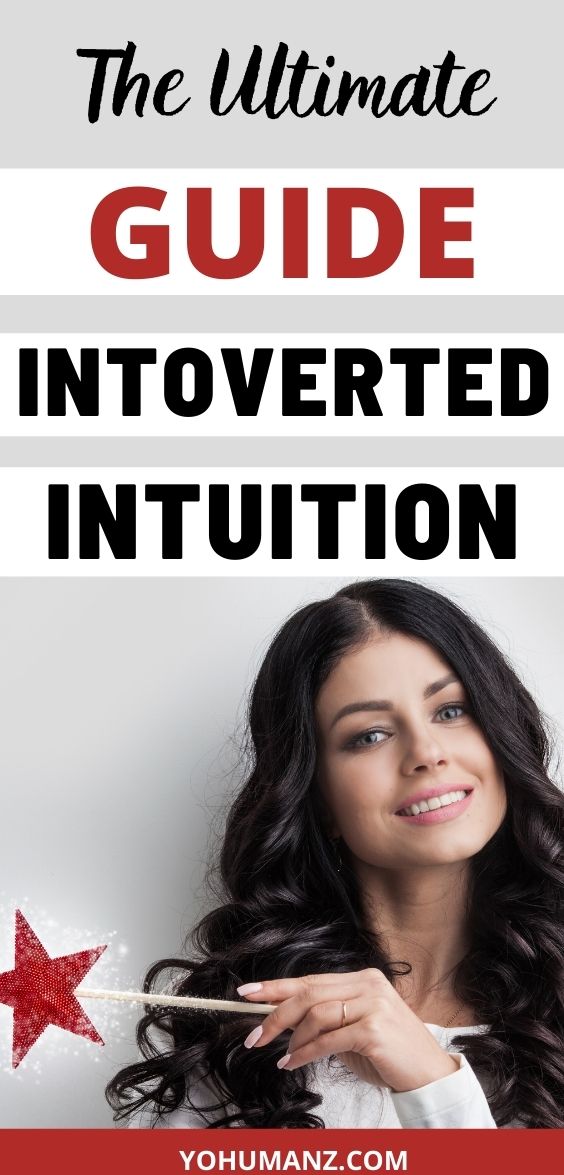Whether you’re into personality tests or spirituality, you probably came across the term “introverted intuition” or “INFJ” or “INTJ.”
But what do those phrases mean? And are you one?
In this post, we’re describing what introverted intuition is, where it originated from and whether you fall into that Myers-Briggs personality type.
Table of Contents
What is Introverted intuition?

Introverted intuition can be thought of in a few ways. The most simple definition is a personality that’s both introverted and intuitive.
Let’s break those 2 terms down further.
Introverted Intuition: A Breakdown
Introverts are more reserved and enjoy spending more time alone. They prefer small groups over large crowds or parties. When they do engage in situations with large amounts of people, they need time alone to recharge their batteries, so to speak. They also tend to be more introspective, self-reflective and “in their heads.”
We can contrast introverts with extroverts, who are more talkative, outgoing and don’t mind being at large parties or even being the life of one. Unlike introverts, extroverts recharge their batteries by being social with others.
What if someone doesn’t fit into either category? You can think of introversion and extroversion as a spectrum rather than two binary options. Most people have traits of both, but lean closer to one side than the other. People that have many of both traits can be classified as an ambivert, which simply means a balance of both.
Now, let’s tackle the term Intuition.
Intuition is the ability to know information without having direct, logical reasoning for it. Another word for it could be “instincts.” For example, intuition is that feeling in your gut that you shouldn’t take the job, even though everything looks perfect in the beginning. Later, you find out the company is involved in scandals, but there’s no way you could have known that at the time–you just felt something was “off.”
So, what’s the reason for our intuition? Some people have a mystical or spiritual take on it. Others have a logical or rational perspective. And others (like me) believe intuition is both magical and ration.
On the magical side, you can think of intuition as a sort of “psychic” power that allows you to see things other people don’t. Most people in this camp believe that intuition is a 6th sense. That means everyone has it and can learn to improve it. But just like picking up an instrument, it comes more naturally to some than others.
On the logical side, some researchers believe intuition is simply a sensitive that allows us to see things others cant. We notice subtle cues such as body language or a different tone of voice and that hints to us that something is different. Even though everyone could see these things, we’re just better at noticing and listening to them. In other cases, we may be intuitive because we’re more in our heads. That is, we give our mind information but also give it time to process that data, leading to more profound realizations.
Introverted Intuition: Myers Briggs
There’s different ways you may come to the conclusion that you’re an introverted intuitive, but most likely, it’s because you took a Myers-Briggs test.
The Myers Briggs test is a personality test created to help you understand your personality type, strengths, weakness, wants and needs. The test was designed based on famous psychologist Carl Jung’s work. The theory is that by learning about ourselves, we can better understand how we act or respond. This can help us make life decisions, such as a career change, or simply allows us to feel at home with who we are. Millions of people have taken the paid test online or through a certified practitioner. If you want to take the test for free, you can try other version, although the accuracy can be a bit shaky, so taking a few may be best. Here’s a free online Myers Brigg-type tests:
After you take the test, you’ll be shown the type you most match with by percentage. There are 16 possible types, all of which consist of 4 letters. Each letter stands for a trait. Here’s a rundown:
- Extraverted (E) vs. Introverted (I)
- Sensing (S) vs. Intuition (N)
- Thinking (T) vs. Feeling (F)
- Judging (J) vs. Perceiving (P)
If your personality type is introverted intuition, your result will be INFJ or INTJ.
Ni and Myers Briggs
In the Myers Briggs world, Introverted Intuiting is represented by (Ni).
There’s 4 Myers Briggs perceiving functions AKA how we get information. Unlike others, Ni happens on an unconscious level–what we call “intuition.” Many people get most of their information through the traditional 5 senses–so they hear something, read something, smell something, etc. But for us Ni’s, we tend to get a lot of our information from our intuition. So, while other people are more “in the world,” we’re more “in our heads.” We really more on our internal insights.
Ni’s have a challenging time trying to stay in the moment and their heads are usually elsewhere. For example, when in a conversation, driving or watching TV, their head may be playing something entirely different. They’re always thinking.
All of this thinking means that Ni’s can easily see the big picture of a situation or problem. Concepts or theories are their thing. Overlooking the situation from a wider perspective, they can connect the dots or spot patterns. Another benefit is that they’re able to play out situations to “foresee” the ending. For example, if a friend asks you whether decision A or B is better, you’d be able to see the consequences and advantages of both and where each will lead them.
Details though? Not so much. Although possible, Ni’s can have a hard time on tasks that require them to be detail-orientated.
In history, before the Myers Briggs test was even created, some believe that those with Ni were likely fortune-tellers, shamans, or other mysterious people.
Now, let’s take a look at the specific personality types of Ni: INFJ and INTJ.
INFJ: A Type of Introverted Intuition
INFJ stands for introverted, intuitive, feeling, and judging.
With INFJ personalities, introverted intuition meets feeling. This makes them good at understanding others, which can also make them more skilled in relationships or on topics such as human rights issues. They’re usually creative, caring and highly sensitive to other people’s emotions as well as their own.
INFJ’s typically enjoy deep topics rather than small talk. They think about the meaning of life, moral standards and consequences or reactions to every action. They’re not one to have friends just to expand their network. They’re more of a meaningful, deep relationship kind of people.
Called the “advocate” type by some, they have the ability to put their ideas for change into real, tangible action.
When you meet an INFJ, they’ll likely come across as quiet, soft-spoken and caring. But on the downside, they can be overly sensitive with high expectations. You may also get the sense that they’re difficult to get to know—probably because they are. To really know an INFJ, you’ll need to try to get inside their head with them. That means meaningful conversations and real connection. They are the #1 to spot when you’re faking it or acting different just to gain something from them. They value honesty, integrity and emotional intimacy. If you’re in a romantic relationship—or even a friendship—with an INFJ, one of the most important factors is whether you share the same core beliefs. Because INFJ’s uphold themselves to a strict moral code in which they try to do good and harm no one, they expect you to as well. That can seem like too much pressure for types that don’t like to get overly deep.
INFJ’s can be stubborn when it comes to issues they believe in and although not typically pushovers, getting into arguments is difficult and overly unpleasant for them.
If you are an INFJ, it will probably interest you to know that you’re a rare gem. Although it’s hard to measure, some theorize that INFJs only make up 1 to 3% of the population.
Many people suspect that Carl Jung, the psychologist who the test is based off of, was an INFJ. After all, to come up with 16 personality types for everyone requires a lot of observation, intuition and inside-your-head work.
A sampling of job types for an INFJ includes psychologist, librarian, entrepreneur, artist, writer and teacher.
INTJ: A Type of Introverted Intuition
Another introverted intuition (Ni) type is the INTJ, which stands for introverted, intuitive, thinking, and judging.
Compared to the INFJ discussed above, they can be better at strategizing. Once they’ve mulled over a situation, they can put it into action easier with sequential steps or a reliable plan. While both types are capable of this, it comes more naturally to an INTJ. Another difference is that although intuitive, they tend to care more about logic, rational conclusions and data. They’re more able to get outside of their head when they feel it’s necessary and put their emotions to the side.
INTJ’s are good at seeing the big picture instead of the small, moving parts. They’re also good at creating order in a situation. They feel most comfortable when they have a sense of control, which makes them more like to plan than the INFJ. In thinking about the future, they’re good at exploring options and differing outcomes.
Whereas an INFJ may make decisions based on their feeling or intuition, INTJ’s are more likely to make them based on logic.
While both types value close relationships over many distant ones, INFJ’s care less about other people’s feelings or thoughts. While they will care for a group of people close to them, their ability for empathy outside that circle is capped.
INFJ’s can be hard to get to know too. Because they can appear “aloof” and really, many don’t care to interact outside of those they know, understanding who they really are can be difficult. But, if you put the time in, they are also willing to put time and effort into the relationship.
Since INFJ’s are more analytical, they tend to have career paths that use that skill.
A sampling of job types for the INFJ includes scientist, mathematician, lawyer, doctor and teacher.
Introverted Intuition (Ni) VS. Extroverted Intuition (Ne): The Difference

In the Myers Brigg personality test, introversion can take two major forms: introverted (Ni) and extroverted (Ne).
We’ve explained the difference between introversion and extroversion in the first section, but what does it mean when we add intuition to both? How can you tell if your intuition is introverted or extroverted?
Both the introverted and extroverted intuitive are good at identifying patterns or causes from a set of data. They have the ability to look at things from a bigger perspective.
Here’s the difference: Introverted Intuitive typically come to these conclusions on their own, inside their heads. They then take that into the world to create changes or solutions. On the other hand, extroverts often come to their intuitive conclusions via brainstorming, role-playing or by running situations by others. Then, they execute on their decision.
Extroverted Intuition Examples
While a brainstorming meeting full of executives could be an introverted person’s worst nightmare, it may actually excite the extroverted intuitive.
If someone uses an introverted intuition to reach a conclusion, you may be confused how they came up with their answer. They also may have a hard time explaining it since it all happened within their head. By contrast, even if the extrovert comes up with the same conclusion, people are more likely to see how she reached it through a sequence of steps or thoughts.
Extroverted intuition can be more scattered, jumping from thought to thought. Introverts can thin about one topic for a lengthier amount of time. To give an example, extroverted intuitives are more likely to dive down a YouTube rabbit hole and end up watching something random, thinking “how did I get here?” Meanwhile, introverted intuitives are more likely to go down a YouTube rabbit hole on the same subject, delving in deeper and deeper.
Another example would be to imagine introverted intuition like a computer program. You don’t even notice it, but there’s a lot of systems working in the background to allow you to even read this screen. On the other hand, extroverted intuitives need to do those “calculations” consciously and outwardly in a way you can see or hear.
So, both are good at connecting the dots or seeing relationships in data. But extroverts do it consciously while introverts do this inwardly with rumination.
25 Signs of Introverted intuition

Introverted intuitives share many things in common, but it’s still important to realize that personality varies person by person. That’s why the Myers Briggs test is more a personality measurement rather than a promise to fit your inside one perfectly square box. As such, if you’re an introverted intuitive, everything on this list may not apply. Still though, these signs give you helpful hints as to whether you’d be classified as an introverted intuitive.
#1 You Like Abstract Convos
You like discussing ideas that others may think are abstract or hard to pin down. You’re excited to talk about theories that explain events rather than the events themselves.
#2 Big Picture Conv
You can talk about someone’s experience for hours. But what really interests you about that isn’t really the details—it’s the big picture. For example, you can connect dots of a person’s childhood story to figure out how or why they became the person they are today.
#3 Small Talk is Okay If It Makes You Go Away
As a rule, introverted intuitives hate small talk because it’s meaningless. They’d much rather deep conversations. There is an exception though: If you meet someone new and you know that just a little small talk will get them to go away, you’ll do it. It’s not to be rude, you just like to be alone or with a small group of known people only.
#4 I Like Doing Things Alone
If you’re an introverted intuitive there’s a good chance that the phrases “let’s get into groups” or “team meeting” makes you want to run until no human is left in sight.
#5 I Want to Get Behind the Mask
This is a bad analogy in the time of COVID-19, but still. When you meet someone, you don’t care that much to hear about their day-to-day life. You want to know who they really are when they take off the mask. What are their innermost fears, hurts, desires etc.?
#6 I Need Time to Go Inside
You need time alone where you can just be by yourself without any distractions, not even TV. This allows you to get inside your own thoughts and allow your mind to work.
#7 I Need a Break from Stimulation
Even when you go to an event you like, say a concert for your favorite singer, you need a break from the stimulation. While others can go from event to event to party to party, you need time away from the noise to reset.
#8 I Am Interested in Spiritual Topics
Not every person with introverted intuition will be interested in spirituality. Some are hardcore science folks. But types that fall within this category are more likely to be interested in otherworldly topics. This could include religion, Buddhism or more mystical subjects such as psychic, palm reading, tarot, astrology and numerology. Since our intuition brings us inside ourselves and allows us to access our subconscious, some of us try to delve even deeper.
#9 We’re Curious
Part of what makes us want to go deep with people or learn mystical topics is that we’re curious. We want to go beyond what’s obvious (our 5 senses) to see what else there is. Or, we are curious to understand how things came to be, which makes us good at recognizing patterns.
#10 You Like Strategy
Despite being intuitive, when you come to conclusions, they are not “airy fairy.” They come complete with a set of steps or ways to move forward. To put this in a more tangible way, you may be great at designing and planning your future. Or, you may love games that involve strategy.
#11 You Can’t Always Explain How You Came to Conclusions
When you ruminate over a topic or idea, sometimes you have trouble explaining how you developed your conclusion because it happened inside your head over a period of time. A simple example could be a child who does a math problem, gets the right answer, but gets points taken off because she can’t explain or show how she got to that answer.
#12 You Look for Meaning in Most Things
When most people see a weird, bizarre video or animation, they may think “what was that creator on?” However, you may think “what was she trying to convey?” or “what’s the message?”
#13 Instincts are Natural to You
While other people think that following their gut can be risky, you have experience with it and know it’s your God-given skill. You use it to make important decisions, even if it doesn’t always align with the logical data.
#14 You Need to Have Purpose
Introverted intuitives are driven by purpose and meaning, so naturally, they’ll find that in their work or hobbies. If this type doesn’t find their “purpose” they themselves may end up feeling meaningless and/or depressed.
#15 You are Creative
Many intuitives are creative in different senses of the word. This doesn’t mean you paint pictures or draw or even craft. Creativity can be put to work in many situations, such as creative ways of problem solving in the work world.
#16 You’re Stubborn in Your Morals
What you believe in you believe in your core and there’s no shaking that. While some people can be convinced by the masses or peer pressure, you’re more moved by your inner knowingness that you’re doing the right thing.
#17 You Don’t Give a Sht About Power
While many people can be convinced by someone’s power or fame, you can read through the bull real quick. And you won’t put up with it. While they may be lured into their hypnotic trance of superficial success, you’re more likely to roll your eyes and walk away. Friends: Introverted intuitive are not the type to be wooed by your designer clothing or fancy car on a first date. Just no.
#18 You Can See Different Perspectives
Many people can’t envision realities outside of their own. But because you’re so in your head, you’ve probably put yourself in the shoes of other people many times. This gives you a wider perspective on issues, so you are able to see things from varying sides, even if you don’t necessarily agree with them.
#19 Quiet but Powerful
You may be quiet and stand on the sidelines when people are talking about things you don’t care about. But if you see something wrong happening, your personality almost shifts. Because you’re so convinced of your morals, you come out of your “shell” when something isn’t right. You’ll say or do what it takes to right the situation, even if others aren’t making a big deal about it.
#20 Connecting with People Can Be Hard
Once we connect with people, we really connect with them. But most of the times, it’s hard for us to meet new people or put ourselves in uncomfortable situations. We could spend weeks alone before feeling lonely and being coaxed outside by a friend.
#21 Friends Say You’re a Good Listener
Introverted intutives, particularly INFJ’s make great therapists. That’s because listening comes naturally to them. While the INTJ may listen, she may do so less empathically whereas INFJs are more connected to feelings and emotion.
#22 You Daydream or Zone Out
When you’re driving, sitting on transit, walking or doing pretty much anything that doesn’t require your full attention, you have a tendency to zone out. Often this comes in the form of daydreaming or envisioning scenarios.
#23 You Enjoy Personal Growth
Plenty of personality types enjoy personal growth. However, introverted intuitives have a natural knack for it.
#24 You’re Private
It can be hard for you to share details about your life or how you feel. Others may see you as private or tell you that you’re hard to get to know.
#25 You Have Trouble Being In the Moment
Being in the moment AKA mindfulness is an important skill because getting out of our heads means less negative thinking and thought patterns. But we have a hard time doing this because we’re always thinking. It can be especially hard to turn off our monkey minds. In turn, meditation is something that can greatly help us but some of us kind of hate it.
Introverted Intuition: A Summary

Introverted intuition can be seen from the sense that someone is an introvert and has intuition. However, the phrase was popularized because of the Myers Briggs personality test, which lists some types being introverted or extroverted intuitives. In this sense, to have introverted intuition means that you often go inside your head and ruminate to solve issues. You notice the subtilties that others may overlook and are able to see the big picture, allowing you to point out patterns or trends. Learning this information about yourself can do a few things. Firstly, it can normalize you when you feel abnormal. Most importantly though, knowing yourself better allows you to make better decisions in varying areas of life.


